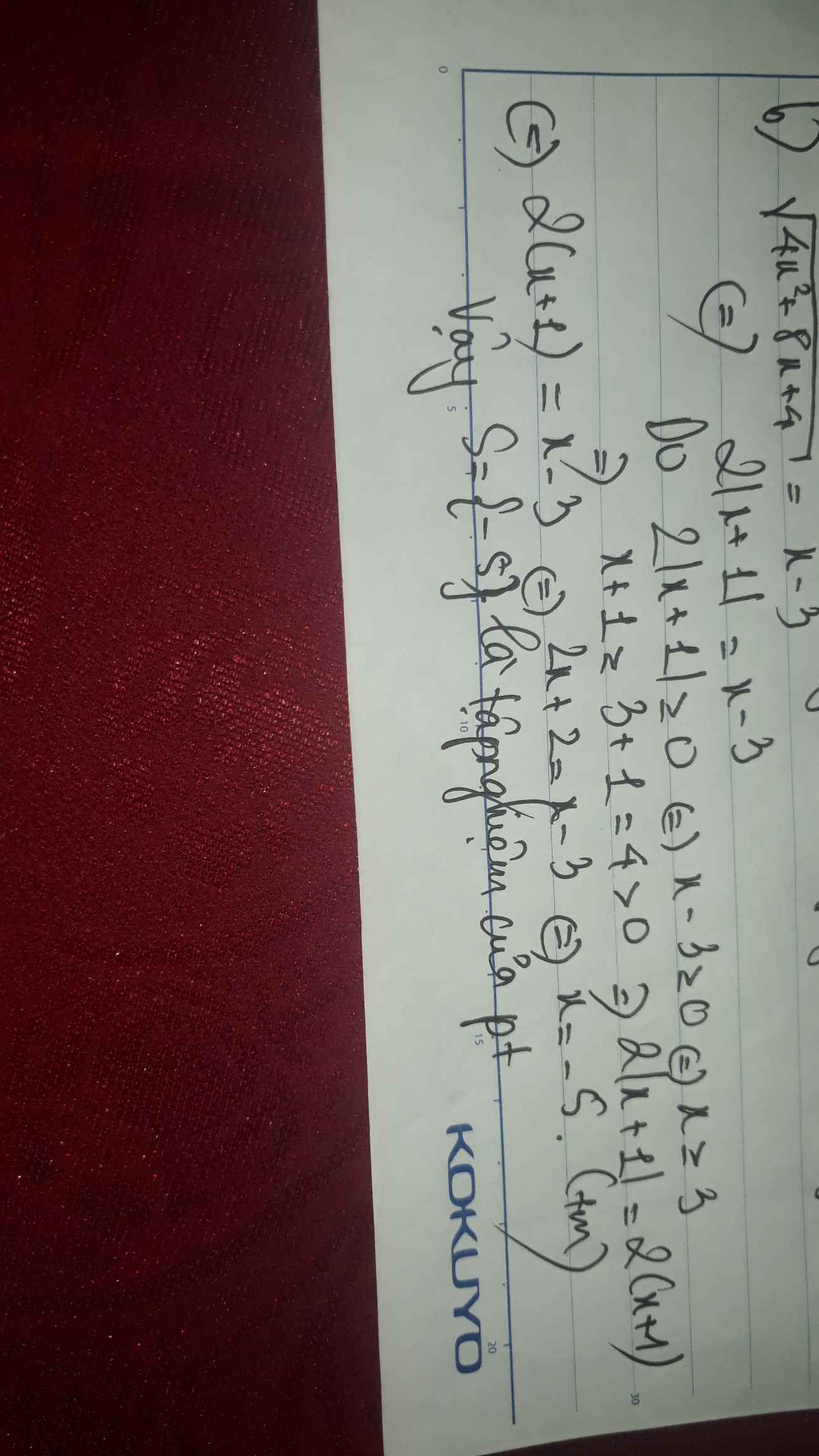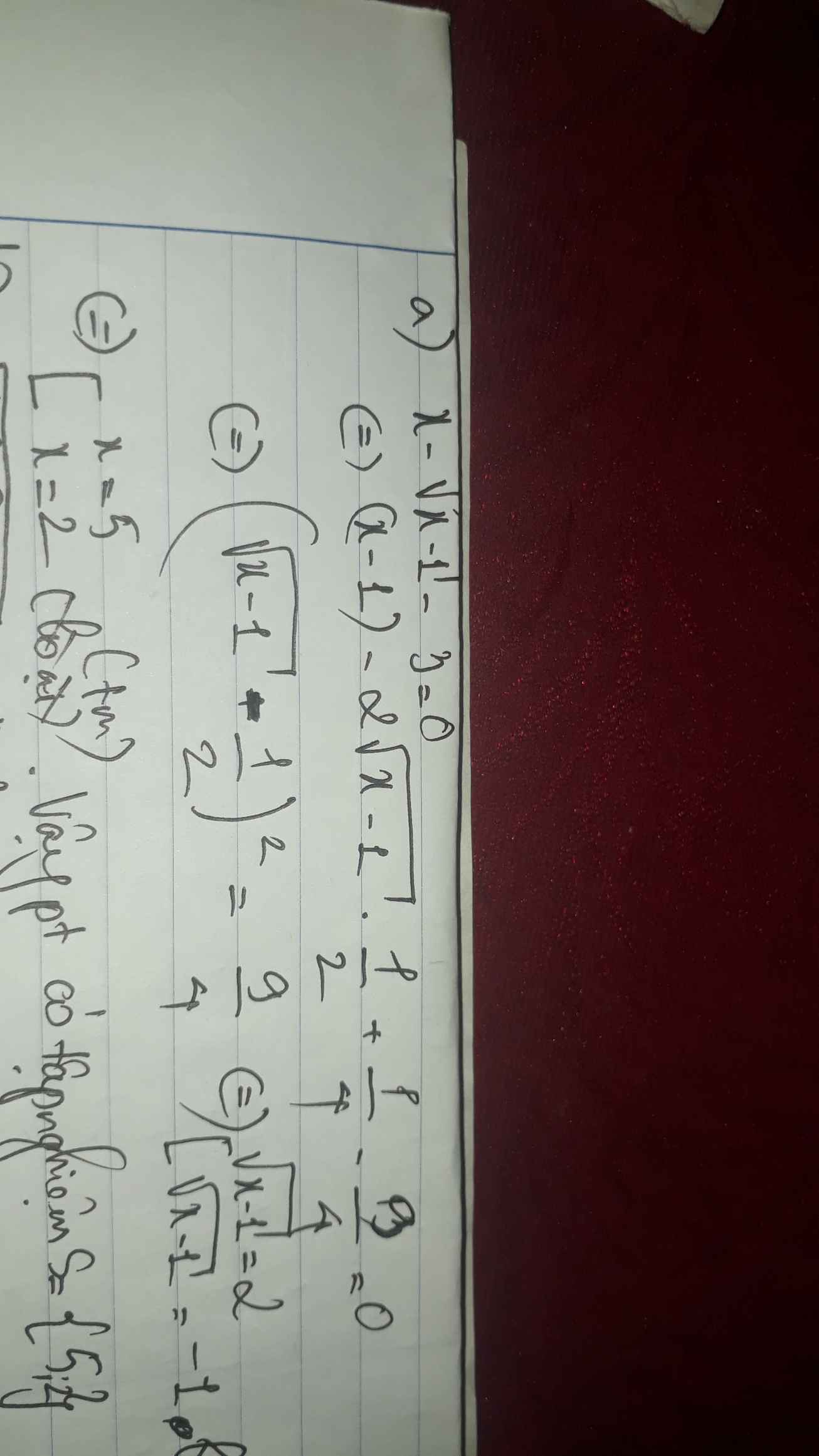Giải phương trình \(\sqrt{x^2-4x+5}=x-1\)
Hãy nhập câu hỏi của bạn vào đây, nếu là tài khoản VIP, bạn sẽ được ưu tiên trả lời.


1. \(\sqrt{x^2-4}-x^2+4=0\)( ĐK: \(\orbr{\begin{cases}x\ge2\\x\le-2\end{cases}}\))
\(\Leftrightarrow\sqrt{x^2-4}=x^2-4\)
\(\Leftrightarrow\left(x^2-4\right)^2=x^2-4\)
\(\Leftrightarrow\left(x^2-4\right)^2-\left(x^2-4\right)=0\)
\(\Leftrightarrow\left(x^2-4\right)\left(x^2-4-1\right)=0\)
\(\Leftrightarrow\orbr{\begin{cases}x^2=4\\x^2=5\end{cases}}\)
\(\Leftrightarrow\orbr{\begin{cases}x=\pm2\left(tm\right)\\x=\pm\sqrt{5}\left(tm\right)\end{cases}}\)
Vậy pt có tập no \(S=\left\{2;-2;\sqrt{5};-\sqrt{5}\right\}\)
2. \(\sqrt{x^2-4x+5}+\sqrt{x^2-4x+8}+\sqrt{x^2-4x+9}=3+\sqrt{5}\)ĐK: \(\hept{\begin{cases}x^2-4x+5\ge0\\x^2-4x+8\ge0\\x^2-4x+9\ge0\end{cases}}\)
\(\Leftrightarrow\sqrt{x^2-4x+5}-1+\sqrt{x^2-4x+8}-2+\sqrt{x^2-4x+9}-\sqrt{5}=0\)
\(\Leftrightarrow\frac{x^2-4x+4}{\sqrt{x^2-4x+5}+1}+\frac{x^2-4x+4}{\sqrt{x^2-4x+8}+2}+\frac{x^2-4x+4}{\sqrt{x^2-4x+9}+\sqrt{5}}=0\)
\(\Leftrightarrow\left(x-2\right)^2\left(\frac{1}{\sqrt{x^2-4x+5}+1}+\frac{1}{\sqrt{x^2-4x+8}+2}+\frac{1}{\sqrt{x^2}-4x+9+\sqrt{5}}\right)=0\)
Từ Đk đề bài \(\Rightarrow\frac{1}{\sqrt{x^2-4x+5}+1}+\frac{1}{\sqrt{x^2-4x+8}+2}+\frac{1}{\sqrt{x^2}-4x+9+\sqrt{5}}>0\)
\(\Rightarrow\left(x-2\right)^2=0\)
\(\Leftrightarrow x=2\left(tm\right)\)
Vậy pt có no x=2

Câu 4:
Giả sử điều cần chứng minh là đúng
\(\Rightarrow x=y\), thay vào điều kiện ở đề bài, ta được:
\(\sqrt{x+2014}+\sqrt{2015-x}-\sqrt{2014-x}=\sqrt{x+2014}+\sqrt{2015-x}-\sqrt{2014-x}\) (luôn đúng)
Vậy điều cần chứng minh là đúng
2) \(\sqrt{x^2-5x+4}+2\sqrt{x+5}=2\sqrt{x-4}+\sqrt{x^2+4x-5}\)
⇔ \(\sqrt{\left(x-4\right)\left(x-1\right)}-2\sqrt{x-4}+2\sqrt{x+5}-\sqrt{\left(x+5\right)\left(x-1\right)}=0\)
⇔ \(\sqrt{x-4}.\left(\sqrt{x-1}-2\right)-\sqrt{x+5}\left(\sqrt{x-1}-2\right)=0\)
⇔ \(\left(\sqrt{x-4}-\sqrt{x+5}\right)\left(\sqrt{x-1}-2\right)=0\)
⇔ \(\left[{}\begin{matrix}\sqrt{x-4}-\sqrt{x+5}=0\\\sqrt{x-1}-2=0\end{matrix}\right.\)
⇔ \(\left[{}\begin{matrix}\sqrt{x-4}=\sqrt{x+5}\\\sqrt{x-1}=2\end{matrix}\right.\)
⇔ \(\left[{}\begin{matrix}x\in\varnothing\\x=5\end{matrix}\right.\)
⇔ x = 5
Vậy S = {5}

a.
\(3\sqrt{-x^2+x+6}\ge2\left(1-2x\right)\)
\(\Leftrightarrow\left[{}\begin{matrix}\left\{{}\begin{matrix}-x^2+x+6\ge0\\1-2x< 0\end{matrix}\right.\\\left\{{}\begin{matrix}1-2x\ge0\\9\left(-x^2+x+6\right)\ge4\left(1-2x\right)^2\end{matrix}\right.\end{matrix}\right.\)
\(\Leftrightarrow\left[{}\begin{matrix}\left\{{}\begin{matrix}-2\le x\le3\\x>\dfrac{1}{2}\end{matrix}\right.\\\left\{{}\begin{matrix}x\le\dfrac{1}{2}\\25\left(x^2-x-2\right)\le0\end{matrix}\right.\end{matrix}\right.\)
\(\Leftrightarrow\left[{}\begin{matrix}\dfrac{1}{2}< x\le3\\\left\{{}\begin{matrix}x\le\dfrac{1}{2}\\-1\le x\le2\end{matrix}\right.\end{matrix}\right.\)
\(\Rightarrow-1\le x\le3\)
b.
ĐKXĐ: \(x\ge0\)
\(\Leftrightarrow\sqrt{2x^2+8x+5}-4\sqrt{x}+\sqrt{2x^2-4x+5}-2\sqrt{x}=0\)
\(\Leftrightarrow\dfrac{2x^2+8x+5-16x}{\sqrt{2x^2+8x+5}+4\sqrt{x}}+\dfrac{2x^2-4x+5-4x}{\sqrt{2x^2-4x+5}+2\sqrt{x}}=0\)
\(\Leftrightarrow\dfrac{2x^2-8x+5}{\sqrt{2x^2+8x+5}+4\sqrt{x}}+\dfrac{2x^2-8x+5}{\sqrt{2x^2-4x+5}+2\sqrt{x}}=0\)
\(\Leftrightarrow\left(2x^2-8x+5\right)\left(\dfrac{1}{\sqrt{2x^2+8x+5}+4\sqrt{x}}+\dfrac{1}{\sqrt{2x^2-4x+5}+2\sqrt{x}}\right)=0\)
\(\Leftrightarrow2x^2-8x+5=0\)
\(\Leftrightarrow x=\dfrac{4\pm\sqrt{6}}{2}\)

Lời giải:
Đặt $\sqrt[3]{x^2+3x-5}=a; \sqrt[3]{x+2}=b$. Khi đó pt đã cho tương đương với:
$a+b=\sqrt[3]{a^3+b^3-1}+1$
$\Leftrightarrow a+b-1=\sqrt[3]{a^3+b^3-1}$
$\Leftrightarrow (a+b-1)^3=a^3+b^3-1$
$\Leftrightarrow (a+b)^3-3(a+b)^2+3(a+b)-1=a^3+b^3-1$
$\Leftrightarrow 3ab(a+b)-3(a+b)^2+3(a+b)=0$
$\Leftrightarrow ab(a+b)-(a+b)^2+(a+b)=0$
$\Leftrightarrow (a+b)(ab-a-b+1)=0$
$\Leftrightarrow (a+b)(a-1)(b-1)=0$
Nếu $a+b=0\Leftrightarrow \sqrt[3]{x^2+3x-5}=-\sqrt[3]{x+2}$
$\Leftrightarrow x^2+3x-5=-(x+2)$
$\Leftrightarrow x^2+4x-3=0$
$\Leftrightarrow x=-2\pm \sqrt{7}$
Nếu $a-1=0\Leftrightarrow \sqrt[3]{x^2+3x-5}=1$
$\Leftrightarrow x^2+3x-6=0$
$\Leftrightarrow x=\frac{-3\pm \sqrt{33}}{2}$
Nếu $b-1=0\Leftrightarrow \sqrt[3]{x+2}=1$
$\Leftrightarrow x=-1$

ĐKXĐ: \(x\ge\dfrac{2}{3}\)
Đặt a\(=\sqrt{4x+1};b=\sqrt{3x-2}\left(a\ge\sqrt{\dfrac{11}{3}};b\ge0\right)\)
\(\Rightarrow a^2-b^2=x+3\)
\(\Rightarrow5a=5b+a^2-b^2\Leftrightarrow5\left(a-b\right)+\left(a-b\right)\left(a+b\right)=0\Leftrightarrow\left(a-b\right)\left(a+b+5\right)=0\Leftrightarrow a-b=0\) vì \(a+b+5\ge\sqrt{\dfrac{11}{3}}+5>0\)
\(\Leftrightarrow a=b\Leftrightarrow\sqrt{4x+1}=\sqrt{3x-2}\Rightarrow4x+1=3x-2\Leftrightarrow x=-3\) (L)
Vậy pt vô nghiệm
ĐKXĐ: \(x\ge\dfrac{2}{3}\)
Đặt \(\left\{{}\begin{matrix}\sqrt{4x+1}=a>0\\\sqrt{3x-2}=b\ge0\end{matrix}\right.\) ta được:
\(5a=5b+a^2-b^2\)
\(\Leftrightarrow\left(a-b\right)\left(a+b\right)-5\left(a-b\right)=0\)
\(\Leftrightarrow\left(a-b\right)\left(a+b-5\right)=0\)
\(\Leftrightarrow\left[{}\begin{matrix}a=b\\a+b=5\end{matrix}\right.\)
\(\Leftrightarrow\left[{}\begin{matrix}\sqrt{4x+1}=\sqrt{3x-2}\\\sqrt{4x+1}+\sqrt{3x-2}=5\end{matrix}\right.\)
\(\Leftrightarrow\left[{}\begin{matrix}x=-3\left(ktm\right)\\\sqrt{4x+1}-3+\sqrt{3x-2}-2=0\end{matrix}\right.\)
\(\Leftrightarrow\dfrac{4\left(x-2\right)}{\sqrt{4x+1}+3}+\dfrac{3\left(x-2\right)}{\sqrt{3x-2}+2}=0\)
\(\Leftrightarrow\left(x-2\right)\left(\dfrac{4}{\sqrt{4x+1}+3}+\dfrac{3}{\sqrt{3x-2}+2}\right)=0\)
\(\Leftrightarrow x=2\)

1) \(\sqrt[]{9\left(x-1\right)}=21\)
\(\Leftrightarrow9\left(x-1\right)=21^2\)
\(\Leftrightarrow9\left(x-1\right)=441\)
\(\Leftrightarrow x-1=49\Leftrightarrow x=50\)
2) \(\sqrt[]{1-x}+\sqrt[]{4-4x}-\dfrac{1}{3}\sqrt[]{16-16x}+5=0\)
\(\Leftrightarrow\sqrt[]{1-x}+\sqrt[]{4\left(1-x\right)}-\dfrac{1}{3}\sqrt[]{16\left(1-x\right)}+5=0\)
\(\)\(\Leftrightarrow\sqrt[]{1-x}+2\sqrt[]{1-x}-\dfrac{4}{3}\sqrt[]{1-x}+5=0\)
\(\Leftrightarrow\sqrt[]{1-x}\left(1+3-\dfrac{4}{3}\right)+5=0\)
\(\Leftrightarrow\sqrt[]{1-x}.\dfrac{8}{3}=-5\)
\(\Leftrightarrow\sqrt[]{1-x}=-\dfrac{15}{8}\)
mà \(\sqrt[]{1-x}\ge0\)
\(\Leftrightarrow pt.vô.nghiệm\)
3) \(\sqrt[]{2x}-\sqrt[]{50}=0\)
\(\Leftrightarrow\sqrt[]{2x}=\sqrt[]{50}\)
\(\Leftrightarrow2x=50\Leftrightarrow x=25\)
1) \(\sqrt{9\left(x-1\right)}=21\) (ĐK: \(x\ge1\))
\(\Leftrightarrow3\sqrt{x-1}=21\)
\(\Leftrightarrow\sqrt{x-1}=7\)
\(\Leftrightarrow x-1=49\)
\(\Leftrightarrow x=49+1\)
\(\Leftrightarrow x=50\left(tm\right)\)
2) \(\sqrt{1-x}+\sqrt{4-4x}-\dfrac{1}{3}\sqrt{16-16x}+5=0\) (ĐK: \(x\le1\))
\(\Leftrightarrow\sqrt{1-x}+2\sqrt{1-x}-\dfrac{4}{3}\sqrt{1-x}+5=0\)
\(\Leftrightarrow\dfrac{5}{3}\sqrt{1-x}+5=0\)
\(\Leftrightarrow\dfrac{5}{3}\sqrt{1-x}=-5\) (vô lý)
Phương trình vô nghiệm
3) \(\sqrt{2x}-\sqrt{50}=0\) (ĐK: \(x\ge0\))
\(\Leftrightarrow\sqrt{2x}=\sqrt{50}\)
\(\Leftrightarrow2x=50\)
\(\Leftrightarrow x=\dfrac{50}{2}\)
\(\Leftrightarrow x=25\left(tm\right)\)
4) \(\sqrt{4x^2+4x+1}=6\)
\(\Leftrightarrow\sqrt{\left(2x+1\right)^2}=6\)
\(\Leftrightarrow\left|2x+1\right|=6\)
\(\Leftrightarrow\left[{}\begin{matrix}2x+1=6\left(ĐK:x\ge-\dfrac{1}{2}\right)\\2x+1=-6\left(ĐK:x< -\dfrac{1}{2}\right)\end{matrix}\right.\)
\(\Leftrightarrow\left[{}\begin{matrix}2x=5\\2x=-7\end{matrix}\right.\)
\(\Leftrightarrow\left[{}\begin{matrix}x=\dfrac{5}{2}\left(tm\right)\\x=-\dfrac{7}{2}\left(tm\right)\end{matrix}\right.\)
5) \(\sqrt{\left(x-3\right)^2}=3-x\)
\(\Leftrightarrow\left|x-3\right|=3-x\)
\(\Leftrightarrow x-3=3-x\)
\(\Leftrightarrow x+x=3+3\)
\(\Leftrightarrow x=\dfrac{6}{2}\)
\(\Leftrightarrow x=3\)

ĐKXĐ: \(\left[{}\begin{matrix}x\ge1\\-\dfrac{3}{2}\le x\le-1\end{matrix}\right.\)
\(\left(x^2+2x+1\right)+\left(2x+3-2\sqrt{2x+3}+1\right)+\sqrt{x^2-1}=0\)
\(\Leftrightarrow\left(x+1\right)^2+\left(\sqrt{2x+3}-1\right)^2+\sqrt{x^2-1}=0\)
Do \(\left\{{}\begin{matrix}\left(x+1\right)^2\ge0\\\left(\sqrt{2x+3}-1\right)^2\ge0\\\sqrt{x^2-1}\ge0\end{matrix}\right.\) với mọi x thuộc TXĐ
\(\Rightarrow\) Đẳng thức xảy ra khi và chỉ khi:
\(\left\{{}\begin{matrix}\left(x+1\right)^2=0\\\left(\sqrt{2x+3}-1\right)^2=0\\\sqrt{x^2-1}=0\end{matrix}\right.\) \(\Rightarrow x=-1\)
Vậy pt có nghiệm duy nhất \(x=-1\)

a, ĐKXĐ : \(x\ge\dfrac{1}{2}\)
PT <=> 2x - 1 = 5
<=> x = 3 ( TM )
Vậy ...
b, ĐKXĐ : \(x\ge5\)
PT <=> x - 5 = 9
<=> x = 14 ( TM )
Vậy ...
c, PT <=> \(\left|2x+1\right|=6\)
\(\Leftrightarrow\left[{}\begin{matrix}2x+1=6\\2x+1=-6\end{matrix}\right.\)
\(\Leftrightarrow\left[{}\begin{matrix}x=\dfrac{5}{2}\\x=-\dfrac{7}{2}\end{matrix}\right.\)
Vậy ...
d, PT<=> \(\left|x-3\right|=3-x\)
\(\Leftrightarrow\left[{}\begin{matrix}x-3=x-3\\x-3=3-x\end{matrix}\right.\)
Vậy phương trình có vô số nghiệm với mọi x \(x\le3\)
e, ĐKXĐ : \(-\dfrac{5}{2}\le x\le1\)
PT <=> 2x + 5 = 1 - x
<=> 3x = -4
<=> \(x=-\dfrac{4}{3}\left(TM\right)\)
Vậy ...
f ĐKXĐ : \(\left[{}\begin{matrix}x\le0\\1\le x\le3\end{matrix}\right.\)
PT <=> \(x^2-x=3-x\)
\(\Leftrightarrow x=\pm\sqrt{3}\) ( TM )
Vậy ...
a) \(\sqrt{2x-1}=\sqrt{5}\) (x \(\ge\dfrac{1}{2}\))
<=> 2x - 1 = 5
<=> x = 3 (tmđk)
Vậy S = \(\left\{3\right\}\)
b) \(\sqrt{x-5}=3\) (x\(\ge5\))
<=> x - 5 = 9
<=> x = 4 (ko tmđk)
Vậy x \(\in\varnothing\)
c) \(\sqrt{4x^2+4x+1}=6\) (x \(\in R\))
<=> \(\sqrt{\left(2x+1\right)^2}=6\)
<=> |2x + 1| = 6
<=> \(\left[{}\begin{matrix}\text{2x + 1=6}\\\text{2x + 1}=-6\end{matrix}\right.< =>\left[{}\begin{matrix}x=\dfrac{5}{2}\\x=\dfrac{-7}{2}\end{matrix}\right.\)(tmđk)
Vậy S = \(\left\{\dfrac{5}{2};\dfrac{-7}{2}\right\}\)


\(\sqrt{x^2-4x+5}=x-1\)
\(\Leftrightarrow\hept{\begin{cases}x^2-4x+5=\left(x-1\right)^2\\x-1\ge0\end{cases}}\)
\(\Leftrightarrow\hept{\begin{cases}x^2-4x+5=x^2-2x+1\\x-1\ge0\end{cases}}\)
\(\Leftrightarrow\hept{\begin{cases}-2x=-4\\x-1\ge0\end{cases}}\)
\(\Leftrightarrow x=2\).
thử nhân lượng liên hợp xem thế nào =))))
ĐK : x ≥ 1
<=> \(\left(\sqrt{x^2-4x+5}-1\right)-\left(x-2\right)=0\)
<=> \(\frac{x^2-4x+4}{\sqrt{x^2-4x+5}+1}-\left(x-2\right)=0\)
<=> \(\left(x-2\right)\left(\frac{x-2}{\sqrt{x^2-4x+5}+1}-1\right)=0\)
<=> \(\orbr{\begin{cases}x-2=0\\\frac{x-2}{\sqrt{x^2-4x+5}+1}-1=0\end{cases}}\)<=> \(\orbr{\begin{cases}x=2\\\frac{x-2}{\sqrt{x^2-4x+5}+1}-1=0\end{cases}}\)
Xét \(\frac{x-2}{\sqrt{x^2-4x+5}+1}-1\)ta có :
\(\frac{x-2}{\sqrt{x^2-4x+5}+1}-1=\frac{x}{\sqrt{x^2-4x+5}+1}-\left(\frac{2}{\sqrt{x^2-4x+5}+1}+1\right)\)
Ta có : \(\sqrt{x^2-4x+5}+1\ge2\forall x\Rightarrow-\left(\frac{2}{\sqrt{x^2-4x+5}+1}+1\right)\ge2\forall x\)
Lại có \(\frac{x}{\sqrt{x^2-4x+5}+1}>0\forall x>1\Rightarrow\frac{x}{\sqrt{x^2-4x+5}+1}-\left(\frac{2}{\sqrt{x^2-4x+5}+1}+1\right)>0\forall x>1\)
=> \(\frac{x-2}{\sqrt{x^2-4x+5}+1}-1\)vô nghiệm
Vậy phương trình có nghiệm duy nhất x = 2